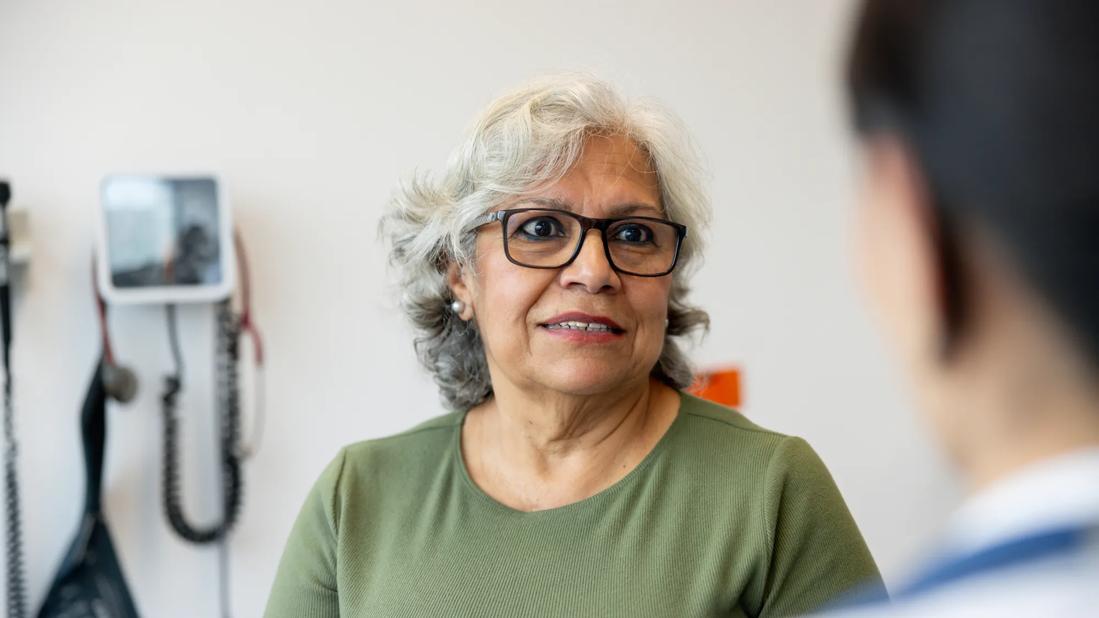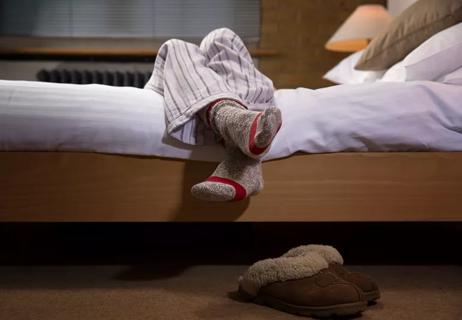Estrogen loss contributes to bone loss, which significantly raises your risk of osteopenia and osteoporosis

You know about hot flashes, vaginal dryness and mood swings. But menopause can also weaken your bones. That’s because your body stops making as much estrogen, a hormone that helps keep bones strong. In fact, you can lose up to 20% of your bone density within five years of starting menopause.
Advertisement
Cleveland Clinic is a non-profit academic medical center. Advertising on our site helps support our mission. We do not endorse non-Cleveland Clinic products or services. Policy
So, how does it happen, why does it matter and what can you do about it? Women’s health specialist Pelin Batur, MD, explains everything you need to know about menopause bone loss.
Your bones are living, growing tissues that are always remodeling themselves. When you’re young, they rebuild quickly. But starting in your 30s, they can’t rebuild as fast as they used to.
The culprit is estrogen — or, more accurately, a lack of it. Estrogen is a hormone that regulates your menstrual cycle and protects you from bone loss. But during menopause, your estrogen levels start to drop. And when that happens, bone loss speeds up.
“Estrogen has a very protective role up until menopause,” Dr. Batur says. “It’s important for bone development and maintaining bone density. So, when estrogen loss begins, you go through a rapid drop in bone density.”
Bone loss raises your risk of fractures and can lead to osteopenia (low bone mineral density) and osteoporosis (weak bones). So, taking care of your bones is a key aspect of caring for your health in menopause.
Here’s how to protect your bones during this time of life.
As soon as menopause makes its presence known, it’s time to talk to your healthcare provider. They may recommend a baseline bone density test (DXA scan) to check your bone health.
Advertisement
Getting a DXA scan is easy and painless, similar to getting an X-ray. And the results will tell your provider how dense your bones are.
“All women should get a bone density test by age 65,” Dr. Batur says. “But if you have certain risk factors, you need one earlier.” Those factors may include:
It’s probably no surprise to learn that the same things doctors recommend for living an overall healthy life also help keep your bones healthy:
Still, these steps may not be enough on their own. If you’re losing bone quickly, all the exercise and milk in the world won’t stop it. In that case, your healthcare provider may recommend medication.
A variety of medications, both hormonal and nonhormonal, can help with menopause-related bone loss.
“There are a lot of treatment options available to us,” Dr. Batur says. “What your doctor recommends for you will all come down to factors like your medical background, priorities and comfort level.”
She outlines some of the options.
Hormone therapy (HT) targets all of your symptoms, including bone loss. It’s most helpful when used around the beginning of menopause, which is defined as one year after your final menstrual period. (Hormone therapy is called hormone replacement therapy, or HRT, when it’s needed before age 40.)
“HT is often a great choice because it helps prevent bone loss and tackles symptoms like hot flashes and vaginal dryness,” Dr. Batur explains.
There are different courses of HT for menopause, and what’s right for you will depend on your medical situation, like whether you:
But about 5% to 15% of women still lose bone density on HT, so regular check-ins with your provider are key.
If you can’t be on HT, or if you’re on HT but still losing bone, your provider may prescribe bisphosphonates. These medications are designed to slow bone loss.
Advertisement
“Bisphosphonates are much more effective at preventing fractures than hormones, and they’ve been associated with some benefits to help fight cardiovascular diseases and cancer, too,” Dr. Batur says.
But taking bisphosphonates for longer than three years may bring some health risks, like osteonecrosis of the jaw and fractures of the hip or thigh. Though these risks are rare, your provider can lessen them by changing your medication or recommending a “drug holiday,” where you take a break from bisphosphonates for a certain amount of time.
Selective estrogen receptor modulators (SERMs), also sometimes called estrogen receptor agonists/antagonists, work in a unique way with the estrogen receptors throughout your body. They may also be called designer hormones.
“These medications work like estrogen in some parts of the body, but they work like anti-estrogen in other parts,” Dr. Batur explains.
Advertisement
If you have severe osteoporosis, your doctor may consider stronger medications that treat osteoporosis, including synthetic peptides (protein fragments made in a lab) or injectable biologics:
Menopause bone loss can’t be completely reversed. But with the right medication, you can slow or stop further loss. And don’t be surprised if your provider discusses changing your treatment plan as time goes on.
“For example, we may recommend hormone therapy in the beginning stages of menopause, when you’re having other symptoms. As you get older and no longer need hormones, we may switch to bone-specific medications,” Dr. Batur illustrates. “That way, we’re maximizing the benefits of each medication, offering it at the right time of your life and minimizing any long-term risks.”
And finally, an important warning: Menopause usually happens between the ages of 45 and 55. If it happens earlier, your risk goes up for other health concerns — not just bone loss.
Advertisement
“Early estrogen loss also raises your risk of heart disease, lung disease and neurological conditions,” Dr. Batur cautions, “so it’s very important to identify it when it starts happening.”
You might think you’re not at risk of bone loss because you feel fine. No joint pain, no broken bones, no problems, right? Not quite.
“Osteoporosis is often called the silent thief because people generally don’t have any symptoms until they experience a fracture,” Dr. Batur clarifies.
In other words, make no bones about it: If you’re going through menopause or starting to experience symptoms, it’s time to talk to a doctor about preventing osteopenia and osteoporosis. Your bones will thank you for it!
Learn more about our editorial process.
Advertisement

Making certain changes to your diet, sleep habits and even your wardrobe may help lessen the impact of menopause symptoms

A women’s health specialist explains those cold flashes that come on quickly

Changing hormone levels can bring issues like brittle nails, indigestion, dry skin and new allergies (to name a few!)

The choices you make at mealtime could reduce hot flashes or make them worse

If you’ve noticed changes in your mood and mental health while going through menopause, you’re not alone

Missed periods, heavy periods, painful sex and frequent hot flashes are just a few symptoms worth discussing with your provider

At-home tests measure FSH levels in urine, but they can’t actually diagnose menopause

You may be more prone to hot flashes if you have anxiety, but hot flashes can also rev up anxiety

Wearing a scarf, adjusting your outdoor activities and following your asthma treatment plan can help limit breathing problems

Your diet in the weeks, days and hours ahead of your race can power you to the finish line

When someone guilt trips you, they’re using emotionally manipulative behavior to try to get you to act a certain way